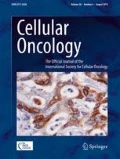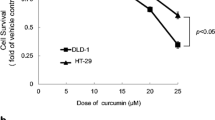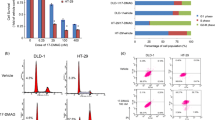Abstract
Background
The glucose regulated heat shock protein 78 (GRP78) is a central regulator of ER (endoplasmic reticulum) stress due to its pro-survival property. Up regulated GRP78 expression in tumor cells has been correlated with aggressive malignancies whereas some reports have predicted an improved prognosis. Over-expression of GRP78 in the ER promotes its localization to the cell surface on several cell types including tumor cells.
Methods
In order to elucidate whether GRP78 receptor positive and negative tumor cells manifest different properties in colorectal cancer, we first artificially separated GRP78 positive and negative sub-populations from HM7 and HCT116 cell lines using anti GRP78 antibody coated magnetic beads.
Results
Only GRP78 negative cells were highly proliferative, induced significant growth in tumor size in nude mice and metastasized to the liver in a human metastatic colorectal carcinoma model in mice. In contrast, GRP78 positive cells manifested reduced proliferation, colony formation, tumor growth and liver metastases. The reduced tumorigenicity of GRP78 positive subpopulation was abrogated by silencing GRP78 expression using siRNA oligomers. In our efforts to induce cell surface GRP78, we subjected the cells to doxorubicin and taxol that increased significantly the percent of GRP78 positive population. Cells pre-incubated with doxorubicin exhibited reduced proliferation and tumor growth in mice.
Conclusion
This study demonstrates the significance of cell surface GRP78 in colon cancer, which may be used as a marker for reduced tumorigenicity.





Similar content being viewed by others
References
D. Fukumura, D.G. Duda, L.L. Munn, R.K. Jain, Tumor microvasculature and microenvironment: novel insights through intravital imaging in pre-clinical models. Microcirculation 17(3), 206–225 (2010)
A.S. Lee, GRP78 induction in cancer: therapeutic and prognostic implications. Cancer Res. 67(8), 496–499 (2007)
M. Ni, Y. Zhang, A.S. Lee, Beyond the endoplasmic reticulum: atypical GRP78 in cell viability, signaling and therapeutic targeting. Biochem. J. 434(2), 181–188 (2011)
R. Kim, M. Emi, K. Tanabe, S. Murakami, Role of the unfolded protein response in cell death. Apoptosis 11, 5–13 (2006)
D. Dong, C. Stapleton, B. Luo, S. Xiong, W. Ye, Y. Zhang, N. Jhaveri, G. Zhu, R. Ye, Z. Liu et al., A critical role for GRP78/BiP in the tumor microenvironment for neovascularization during tumor growth and metastasis. Cancer Res. 71(8), 2848–2857 (2011)
M. Gonzalez-Gronow, M. Cuchacovich, C. Llanos, C. Urzua, G. Gawdi, S.V. Pizzo, Prostate cancer cell proliferation in vitro is modulated by antibodies against glucose-regulated protein 78 isolated from patient serum. Cancer Res. 66(23), 11424–11431 (2006)
J. Kern, G. Untergasser, C. Zenzmaier, B. Sarg, G. Gastl, E. Gunsilius, M. Steurer, GRP-78 secreted by tumor cells blocks the antiangiogenic activity of bortezomib. Blood 114, 3960–3967 (2009)
F.Y. Al-Rawashdeh, P. Sciven, I.C. Cameron, P.V. Vergani, L. Wyld, Unfolded protein response activation contributes to chemoresistance in hepatocellular carcinoma. Eur. J. Gastroenterol. Hepatol. 22(9), 1099–1105 (2010)
G. de Ridder, R. Ray, U.K. Misra, S.V. Pizzo, Modulation of the unfolded protein response by GRP78 in prostate cancer. Methods Enzymol. 489, 245–257 (2011)
S. Daneshmand, M.L. Quek, E. Lin, C. Lee, R.J. Cote, H. Hawes, J. Cai, S. Groshen, G. Lieskovsky, D.G. Skinner et al., Glucose-regulated protein GRP78 is up-regulated in prostate cancer and correlates with recurrence and survival. Hum. Pathol. 38(10), 1547–1552 (2007)
J. Zhang, Y. Jiang, Z.J.Q. Li, W. Gong, L. Wang, D. Wei, J.Y.S. Fang, K. Xie, Association of elevated GRP78 expression with increased lymph node metastasis and poor prognosis in patients with gastric cancer. Clin. Exp. Metastasis 23, 401–410 (2006)
P. Scriven, S. Coulson, R. Haines, S. Balasubramanian, S. Cross, L. Wyld, Activation and clinical significance of the unfolded protein response in breast cancer. Br. J. Cancer 101(10), 1692–1698 (2006)
Y. Fu, J. Li, A.S. Lee, GRP78/BiP Inhibits endoplasmic reticulum BIK and protects human breast cancer cells against estrogen starvation–induced apoptosis. Cancer Res. 67(8), 3734–3740 (2007)
M. Gonzalez-Gronow, M.A. Selim, J. Papalas, S.V. Pizzo, GRP78: a multifunctional receptor on the cell surface. Antioxid. Redox Signal. 11(9), 2299–2306 (2009)
D.J. Davidson, C. Haskell, S. Majest, A. Kherzai, D.A. Egan, K.A. Walter, A. Schneider, E.F. Gubbins, L. Solomon, Z. Chen et al., Kringle 5 of human plasminogen induces apoptosis of endothelial and tumor cells through surface-expressed glucose-regulated protein 78. Cancer Res. 65(11), 4663–4672 (2005)
B. Hardy, A. Battler, C. Weiss, O. Kudasi, A. Raiter, Therapeutic angiogenesis of mouse hind limb ischemia by novel peptide activating GRP78 receptor on endothelial cells. Biochem. Pharmacol. 75, 891–899 (2008)
B. Hardy, A. Raiter, Peptide-binding heat shock protein GRP78 protects cardiomyocytes from hypoxia-induced apoptosis. J. Mol. Med. 88, 157–1167 (2010)
A. Raiter, C. Weiss, Z. Bechor, I. Ben-Dor, A. Battler, B. Kaplan, B. Hardy, Activation of GRP78 on endothelial cell membranes by an ADAM15-derived peptide induces angiogenesis. J. Vasc. Res. 47, 399–411 (2010)
I. Sokolowska, A.G. Woods, M.A. Gawinowicz, U. Roy, C.C. Darie, Identification of potential Tumor Differentiation Factor (TDF) receptor from steroid- responsive and steroid-resistant breast cancer cells. J. Biol. Chem. 287(3), 719–1733 (2011)
H. LeBlanc, D. Lawrence, E. Varfolomeev, K. Totpal, J. Morlan, P. Schow et al., Tumor-cell resistance to death receptor-induced apoptosis through mutational inactivation of the proapoptotic Bcl-2 homolog Bax. Nat. Med. 8, 274–281 (2002)
A. Jansson, X.F. Sun, Bax expression decreases significantly from primary tumor to metastasis in colorectal cancer. J. Clin. Oncol. 20, 811–816 (2002)
H. Takahashi, J. Wang, H. Zheng, S. Masuda, Y. Takano, Overexpression of GRP78 and GRP94 is involved in colorectal carcinogenesis. Histol. Histopathol. 26, 663–671 (2011)
M. Kawada, H. Seno, K. Kanda, Y. Nakanishi, R. Akitake, H. Komekado, K. Kawada, Y. Sakai, E. Mizoguchi, T. Chiba, Chitinase 3-like 1 promotes macrophage recruitment and angiogenesis in colorectal cancer. Oncogene (2011). doi:10.1038/onc.2011.498
B. Hardy, S. Morgenstern, A. Raiter, G. Rodionov, L. Fadaeev, Y. Niv, BAT monoclonal antibody immunotherapy of human metastatic colorectal carcinoma in mice. Cancer Lett. 229(2), 217–222 (2005)
J. Li, A.S. Lee, Stress induction of GRP78/BiP and its role in cancer. Curr. Mol. Med. 6, 46–54 (2006)
P.M. Fernandez, S.O. Tabbara, L.K. Jacobs, F.C.R. Manning, T.N. Tsangaris, A.M. Schwartz, K.A. Kennedy, S.R. Patierno, Overexpression of the glucose-regulated stress gene GRP78 in malignant but not benign human breast lesions. Breast Cancer Res. Treat. 59(1), 15–26 (2000)
Q. Wang, T. Wang, Y. Wang, W. Wang, Y. Wang, X. Hu, S. Shao, J. Zhang, Z. Suo, Q. Wang et al., VP-16 Resistance in the NCI-H460 human lung cancer cell line is significantly associated with glucose-regulated protein78 (GRP78) induction. Anticancer. Res. 27, 2359–2364 (2007)
S. Tsutsumi, T. Namba, K.I. Tanaka, Y. Arai, T. Ishihara, M. Aburaya, S. Mima, T. Hoshino, T. Misushima, Celecoxib upregulates endoplasmic reticulum chaperones that inhibit celecoxib-induced apoptosis in human gastric cells. Oncogene 25(7), 1018–1029 (2006)
R. Su, Z. Li, H. Li, H. Song, C. Bao, J. Wei, L. Cheng, Grp78 promotes the invasion of hepatocellular carcinoma. Cancer 10, 20–32 (2010)
E. Lee, P. Nichols, D. Spicer, S. Groshen, M.C. Yu, A.S. Lee, GRP78 as a novel predictor of responsiveness to chemotherapy in breast cancer. Cancer Res. 66(16), 7849–7853 (2006)
X. Xing, M. Lai, Y. Wang, E. Xu, Q. Huang, Overexpression of glucose-regulated protein 78 in colon cancer. Clin. Chim. Acta 364, 308–315 (2006)
U.K. Misra, M. Gonzalez-Gronow, G. Gawdi, J.P. Hart, C.E. Johnson, S.V. Pizzo, The role of Grp 78 in alpha 2-macroglobulin-induced signal transduction. Evidence from RNA interference that the low density lipoprotein receptor-related protein is associated with, but not necessary for, GRP 78-mediated signal transduction. J. Biol. Chem. 277, 42082–42087 (2002)
M.A. Arap, J. Lahdenranta, P.J. Mintz, A. Hajitou, A.S. Sarkis, W. Arap, R. Pasqualini, Cell surface expression of the stress response chaperone GRP78 enables tumor targeting by circulating ligands. Cancer Cell 6, 275–284 (2004)
N. Rauschert, S. Brändlein, E. Holzinger, F. Hensel, H.K. Müller-Hermelink, H.P. Vollmers, A new tumor-specific variant of GRP78 as target for antibody-based therapy. Lab. Investig. 88, 375–386 (2008)
G. Shani, W.H. Fisher, N.G. Justice, J.A. Kelber, W. Vale, P.C. Gray, GRP78 and Cripto form a complex at the cell surface and collaborate to inhibit transforming growth factor B signaling and enhance cell growth. Mol. Cell. Biol. 28, 666–677 (2008)
Y. Zhang, R. Liu, M. Ni, P. Gill, A.S. Lee, Cell surface relocalization of the endoplasmic reticulum chaperone and unfolded protein response regulator GRP78/BiP. J. Biol. Chem. 285, 15065–15075 (2010)
Y. Kim, A.M. Lillo, S.C. Steiniger, Y. Liu, C. Ballatore, A. Anichini, R. Mortarini, G.F. Kaufmann, B. Zhou, B. Felding-Habermann, K.D. Janda, Targeting heat shock proteins on cancer cells: selection, characterization, and cell-penetrating properties of a peptidic GRP78 ligand. Biochemistry 45, 9434–9444 (2006)
Y. Liu, S.C. Steiniger, Y. Kim, G.F. Kaufmann, B. Felding-Habermann, K.D. Janda, Mechanistic studies of a peptidic GRP78 ligand for cancer cell-specific drug delivery. Mol. Pharm. 4, 435–447 (2007)
U.K. Misra, Y. Mowery, S. Kaczowka, S.V. Pizzo, Ligation of cancer cell surface GRP78 with antibodies directed against its COOH-terminal domain up-regulates p53 activity and promotes apoptosis. Mol. Cancer Ther. 8, 1350–1362 (2009)
H. Uramoto, K. Sugio, T. Oyama, S. Nakata, K. Ono, T. Yoshimastu, M. Morita, K. Yasumoto, Expression of endoplasmic reticulum molecular chaperone Grp78 in human lung cancer and its clinical significance. Lung Cancer 49(1), 55–62 (2005)
H. Takahashi, J.P. Wang, H.C. Zheng, S. Masuda, Y. Takano, Overexpression of GRP78 and GRP94 is involved in colorectal carcinogenesis. Histol. Histopathol. 26(6), 663–671 (2011)
L. Zhang, J. Wang, L. Zhao, T. Wang, J. Wu, S. Fan, L. Chen, S. Shao, H. Molnár, Q. Wang, GRP78 upregulation-induced increase in cisplatin sensitivity of SPCA1 lung cancer cells. Chin. Med. J. (Engl.) 124(20), 3341–3346 (2011)
M.S. Song, Y. Park, J. Lee, K. Park, Induction of glucose-regulated protein 78 by chronic hypoxia in human gastric tumor cells through a protein kinase C-ε/ERK/AP-1 signaling cascade. Cancer Res. 61(22), 8322–8330 (2001)
Y.J. Chang, Y.P. Huang, Z.L. Li, C.H. Chen, GRP78 knockdown enhances apoptosis via the down-regulation of oxidative stress and Akt pathway after epirubicin treatment in colon cancer DLD-1 cells. PLoS One 7(4), e35123 (2012)
M. Sato, V.J. Yao, W. Arap, R. Pasqualini, GRP78 signaling hub a receptor for targeted tumor therapy. Adv. Genet. 69, 97–114 (2010)
Acknowledgments
The authors wish to express their gratitude to Ms. Sara Dominitz for excellent editorial assistance
Conflict of interest
The authors declare no conflict of interests.
Ethical standards
The in vivo models were raised according to the Institutional Animal Care and Use Committee of Tel Aviv University conforming to the NIH Guide for the Care and Use of Laboratory Animals.
Author information
Authors and Affiliations
Corresponding author
Rights and permissions
About this article
Cite this article
Hardy, B., Raiter, A., Yakimov, M. et al. Colon cancer cells expressing cell surface GRP78 as a marker for reduced tumorigenicity. Cell Oncol. 35, 345–354 (2012). https://doi.org/10.1007/s13402-012-0094-4
Accepted:
Published:
Issue Date:
DOI: https://doi.org/10.1007/s13402-012-0094-4




